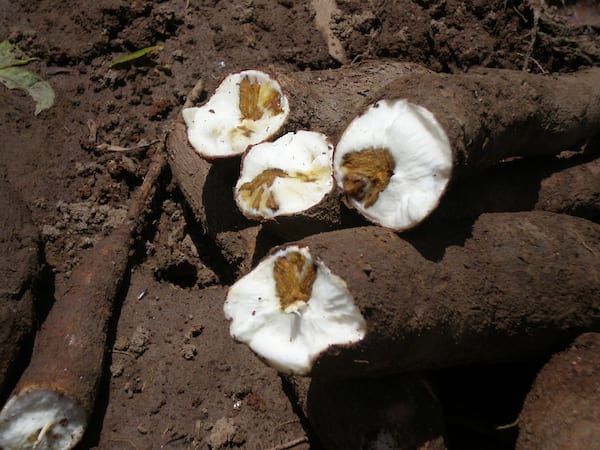Improved Cassava for Farmers Being Assessed by Kenyan Government
Following years of research in the laboratory, greenhouse, and field trials, the Kenyan government is considering approval of a new type of cassava resistant to cassava brown streak disease (CBSD) developed by a consortium of researchers at the Danforth Center, the Kenyan Agriculture and Livestock Research Organization, and the National Crops Resources Research Institute in Uganda working under the Virus Resistant Cassava for Africa Plus (VIRCA Plus) project. The improved cassava can protect farmers from devastating losses of this important food crop and contribute to the creation of thousands of jobs along the value chain due to the crop’s use as animal feed and a source of starch for industry.
Cassava is an important food and cash crop for smallholder farmers in Kenya, but plant diseases including CBSD can destroy up to 100 percent of harvests, threatening family health and welfare. CBSD is spread by whiteflies and by farmers who plant infected cuttings used to establish the next season’s cropping cycle. Infected plants may show no disease symptoms on the leaves, but when the starchy storage roots are harvested, farmers will discover extensive damage due to brown dry rot, making the harvest inedible and without value for animal feed or sale in local markets.

Cassava roots infected with CBSD.
The improved cassava being assessed in Kenya exhibits high levels of resistance to infection by the viruses that cause CBSD. Farmers and consumers will benefit from CBSD resistant cassava as a result of increased cassava root quality and marketable yield.
The National Biosafety Authority (NBA) in Kenya, together with relevant regulatory agencies and independent experts, has initiated a science-based review process to assess the human, livestock, and environmental safety of this CBSD-resistant cassava. Biosafety approval is a prerequisite to national performance trials of CBSD-resistant cassava varieties, which will only be made available to farmers once all necessary authorizations and permits have been received. For more information about the NBA please visit, www.biosafetykenya.go.ke.
“The VIRCA Plus team is excited to reach this milestone in improving agricultural productivity for cassava farmers in East Africa,” said Nigel Taylor, Dorothy J. King Distinguished Investigator and associate member at the Donald Danforth Plant Science Center, and one of the principal investigators for VIRCA Plus. “A positive decision by the Kenya NBA would allow our partners in Kenya to move ahead in bringing disease-resistant cassava varieties to farmers so secure future harvests of this critical staple food crop.”
To learn more please visit, https://cassavaplus.org/kenya/